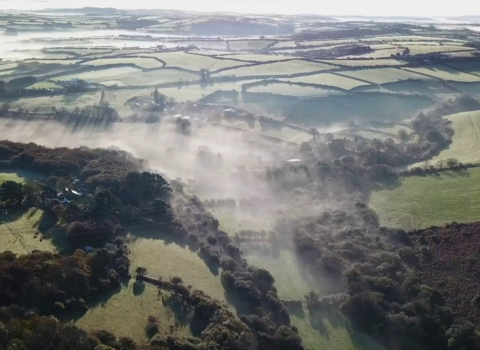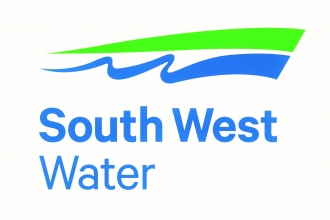What is Upstream Thinking?
Upstream Thinking (UST) is a South West Water funded initiative to protect water quality in the South West. Through UST we work with farmers and landowners across 4 drinking water catchments in West Cornwall to:
- Encourage clean water through reducing the risk of soil, nutrients and pesticides entering rivers and streams
- Enhance wildlife habitats
- Ensure better resilience to extreme weather bought about by climate change
We achieve this through building strong relationships with farmers to find solutions that benefit farm businesses as well as wildlife and the wider environment. Our team of qualified ecologists and farm advisers offer fully funded advice in UST catchments on soil and nutrient management, management of wildlife habitats, and support with applications to countryside stewardship and our UST capital grant. We also run a volunteer group in each catchment, providing free practical help with land management tasks like hedging, scrub clearance and habitat management.
Upstream Thinking in Cornwall
The work of Cornwall Wildlife Trust is centered on the Cober, the Drift reservoir and the Falmouth reservoirs. In 2020, Stithians catchment also joined the portfolio. Cornwall Wildlife Trust farm advisers, ecologists, practical officers and a water quality scientist work with farm and land owners to introduce changes in land use that benefit the raw water quality, wildlife and the quality of the soil.
The program is fully endorsed by our local water quality regulators, the Environment Agency and Natural England.
Working with South West Water
Upstream Thinking is a South West Water funded program which works through its partners; Devon Wildlife Trust, West country Rivers Trust, Farming and Wildlife Advisory Group, Southwest Lakes Trust, University of Exeter, Exmoor Mires, Catchment Sensitive Farming and us at Cornwall Wildlife Trust to deliver the program.
Project success
Number of farms engaged with us to date: 188
Money we have helped bring to the farming sector in Cornwall during the project to date: £2.5 million
Area of habitats improved during the project to date: 180 Hectares
Number of volunteering days delivered on our practical tasks to date: over 3,700 days
Number of native trees planted to date: 4218
Our catchments
For the 2020-2025 phase of the Upstream Thinking Project, we are working with land owners in the catchments of Stithians, Drift, College & Argal and Cober.
Case studies and recent work
Through the Upstream Thinking Project, we are empowering land managers and farmers to move towards more sustainable and regenerative land management and farming practices. We work in a whole-farm manner; looking at farm management as a whole and how we can incorporate reducing runoff, improving soil quality naturally, land shared and spared for nature (on which the food production relies) and looking at how we can make the catchment more resilient to extreme weather.
We continue to develop new science-led approaches to sustainable farming and land management. Have a look at the case study library below to see the different areas of work within the Upstream Thinking Project:
Tree Planting
The Cornwall Wildlife Trust ‘Upstream Thinking’ Project team and ‘Wild Cober’ Volunteer Group have worked with landowners to form new woodlands and increase growth on existing Cornish hedges within the River Cober Drinking Water Catchment Area. To create this new wildlife habitat, the Cober team were provided with saplings by the ‘Tree Appeal’ and only planted native trees appropriate for West Cornwall, in order to increase local biodiversity. These maturing trees benefit the local habitat in many ways: they provide food, structure and shelter for a range of species, create wildlife corridors for birds, bats and other small mammals and insects and give shading to freshwater invertebrates and fish in hot weather. The project has also improved water quality and lowered water treatment costs, with a reduction of soil erosion and run-off pollutants into the River Cober.
Over 1800 trees and shrubs have been planted across seven sites in the Cober Catchment since November 2017, with all tree planting having been carried out by the ‘Wild Cober’ volunteers. This work has involved the support of landowners, who have received no direct financial reward, as well as funded support from a utility company, a statutory organization and two environmental charities. This planting in the Cober catchment provides a range of environmental benefits and would have been hard to achieve without the long-term support and co-ordination of the Upstream Thinking project.
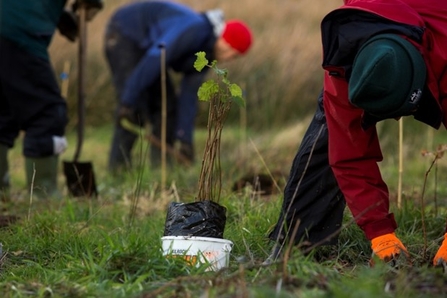
Wild Cober volunteers planting native trees, Image by Rose Summers
Volunteering
Cornwall Wildlife Trust runs a volunteer group in each of the three Drinking Water Catchments included in our Upstream Thinking (UST) areas: Drift, Cober and Falmouth Reservoirs. Through use of these volunteers, Cornwall Wildlife Trust is able to build relationships between the UST team and farmers and landowners in these areas. Volunteers have provided valuable free labour to help farmers and landowners with practical conservation tasks; totaling 3600 volunteer days and £184,000 worth of work across the catchments in the last 5 years (from April 2015 to March 2020).
Upstream Thinking volunteers are available one day a week in all 3 Cornwall Wildlife Trust catchments and carry out a variety of tasks: from undertaking meadow management to invasive species control and tree planting. As well as bringing sizable biodiversity, heritage and access benefits to the land through their work, the UST volunteers also experience many social benefits as part of their participation, including improved confidence, increased levels of physical fitness and greater knowledge and experience in the conservation sector. Cornwall Wildlife Trust’s volunteers are an invaluable part of the Upstream Thinking project and their work has helped to restore valued wildlife habitats across the three catchments.
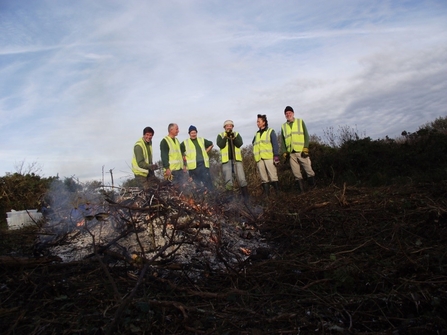
Upstream Thinking volunteers tending a fire after a day's scrub clearance
Soil Management
Through the Upstream Thinking (UST) Project, Cornwall Wildlife Trust has been able to provide free, regular soil testing and soil management advice to farmers within the project’s catchments, supporting them to grow healthy, abundant crops without posing risks to water quality and wildlife.
Before the project started, only 15% of livestock farmers in these areas carried out soil chemistry analysis on their grassland soils and less than 5% regularly used a spade to investigate the health of their soils. Without good understanding of soil health and management, farmers have previously relied on chemical fertilisers that can cause run-off pollutants to enter watercourses and reservoirs and which can harm wildlife in the long-term.
Now, after 5 years of farmer engagement and through novel approaches such as the #soilyourundies competition (to see which farmer had the healthiest soil in the Drift catchment), Cornwall Wildlife Trust staff have noticed farmers embracing a wide range of voluntary changes to their farm practices. This includes cutting fertiliser use and keeping their stock inside during the winter, which brings many soil health benefits. The UST team continue to provide testing and interpret laboratory results (which have been immensely popular with farmers) to help land managers make more informed choices about their soil.
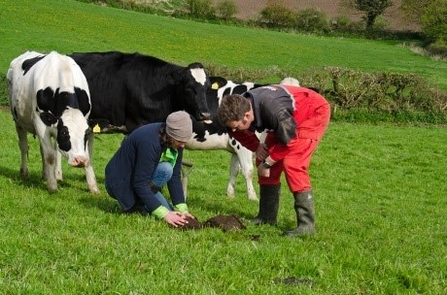
Encouraging farmers to dig holes in their field and examine their soils
Upstream Thinking Project Reports
Take a read of the newly-released report by South West Water (linked above); containing an overview of the Upstream Thinking programme after a successful 10 years. The report features two case studies from the Upstream Thinking Cornwall Wildlife Trust team - one on The Releath Stream and the other on Diverse Leys.
Volunteer on the Upstream Thinking project
Volunteer crew members join from many walks of life - we have animators, architects, DEFRA inspectors, film-makers, artists, children's entertainers, sailors, marketing professionals, authors, nurses, recent graduates, podiatrists, teachers, job-seekers, career-changers and parents. All have a love of our natural environment and have a direct impact through their roles on this project.
The ‘Wild’ volunteer groups carry out hands-on conservation in the three Upstream Thinking catchments every Tuesday and Thursday. For volunteering opportunities with Cornwall Wildlife Trust, check out the volunteering page or contact us directly via volunteering@cornwallwildlifetrust.org.uk
Contact us
We currently have a farm advisor, ecologist, practical tasks team and a water quality scientist keen to work with farmers in each of our focus catchments of Stithians, Drift, College & Argal and Cober. Please get in touch if you would like a call or a visit to find out how we could work together to benefit your business, local habitats and the health of your land.
You can email upstreamthinking@cornwallwildlifetrust.org.uk to find out more.


